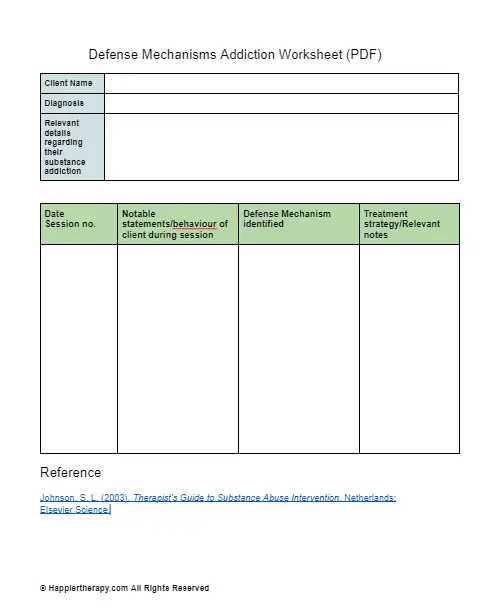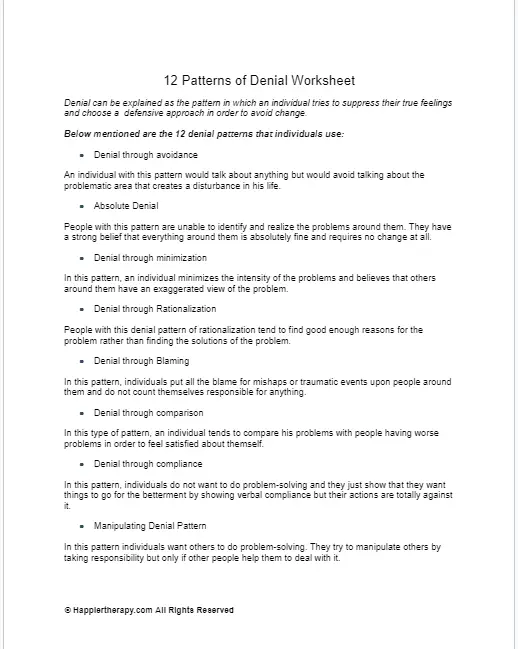Denial Worksheet Substance Abuse
 By
Dr Sabina Alispahic (PhD)
| Reviewed by
Dr Sabina Alispahic (PhD)
By
Dr Sabina Alispahic (PhD)
| Reviewed by
Dr Sabina Alispahic (PhD)
The contents of this article are fact-based except otherwise stated within the article.
Author bio
Dr Sabina Alispahic, PhD, is a psychologist and gestalt psychotherapist with expertise in clinical and health psychology.
Dr Sabina Alispahic’s Highlights:
- Associate Professor at the University of Sarajevo for the past 12 years
- PhD in psychology at the University of Zagreb
- European Certificate of Psychotherapy
Professional experience
Dr Alispahic pioneered innovative teaching methods as an associate professor of clinical and health psychology, inspiring a new generation of mental health professionals while contributing to the field for over 12 years. Also, she empowered individuals across the globe as an online psychotherapist, delivering life-changing therapy and earning a reputation for compassionate care and exceptional results. She has demonstrated expertise in a range of therapeutic approaches (CBT, ACT, Gestalt, mindfulness, and family constellations).
Certifications
European Certificate of Psychotherapy (Education in Gestalt Psychotherapy Training of the Malta Institute)
Eight-week stress reduction mindfulness programme, Society of Psychologists in the Federation of Bosnia and Herzegovina
Education
2009-2013 University of Zagreb, Faculty of Philosophy, Postgraduate Doctoral Studies in Psychology
2004-2008 University of Sarajevo, Faculty of Philosophy, Master Studies, Department of Psychology
Publications
Books
Alispahic. S. (2021). Selected topics from psychotherapy Sarajevo: TDP.
Alispahic. S. (2020). Online psychotherapy. Handbook for psychotherapists and clients Sarajevo: TDP.
Alispahic, S., and Godinjak, A. (2018). (R)evolution of the doctor-patient relationship. Sarajevo: TDP.
Alispahic, S. (2016). The psychology of pain Sarajevo: Faculty of Philosophy (e-publication, Bosnian language): https://ebooks.ff.unsa.ba/index.php/ebooks_ffunsa/catalog/book/29
Book chapters
Alispahic, S. (2018). Psychological Theory and Therapy of Traumatic Memory In: A. Hamburger (ur.), Trauma, Trust, and Memory: Social Trauma and Reconciliation in Psychoanalysis, Psychotherapy, and Cultural Memory, 23-35. London and New York: Routledge, Taylor & Francis Group.
Markovic Pavlovic, M., Alispahic, S., and Dautbegovic, A. (2015). Psychology of Nonkilling in Bosnia-Herzegovina. Knowledge and Attitudes of Students Towards Nonkilling Culture. In: R. Bahtijaragic i J. E. Pim (ur.), Nonkilling Balkans, 171-183. Honolulu: Centre for Global Nonkilling, and Sarajevo: Faculty of Philosophy.
Link: http://nonkilling.org/pdf/nkbalkans.pdf
Articles
Alispahic, S., & Alispahic, B. (2021). Definition of police psychology: The role of psychologists in the police. Technium Soc. Sci. J., 17, 235-244.
Link: https://techniumscience.com/index.php/socialsciences/article/view/2678
Alispahic, S., Hasanbegovic-Anic, E., & Tuce, Đ. (2021). Big Five Personality Traits as Predictors of Mindfulness: A Study on a Bosnian Sample. Epiphany, 14(1), 146-155.
Link: http://epiphany.ius.edu.ba/index.php/epiphany/article/view/357
Alispahic, S. & Hodžić Küreç, A. (2021). How does yoga affect health? Yoga teachers’ experiences. International Scientific Journal of Kinesiology, Vol. 12, 2, 135-140.
Hasanbegovic-Anic, E., Sandic, A., and Alispahic, S. (2018). Prevention of substance abuse in children and adolescents: an evidence-based practice approach. Epiphany, 11(1), 11-30.
Link: http://epiphany.ius.edu.ba/index.php/epiphany/article/view/280
Alispahic, S. and Hasanbegovic-Anic, E. (2017). Mindfulness: Age and Gender Differences in a Bosnian Sample. Psychological Thought, Vol. 10 (1), 155–166.
Hadziahmetovic, N., Alispahic, S., Tuce, Đ., i Hasanbegovic-Anic, E. (2016). Therapist interpersonal style and therapy benefit as determinants of client personality self-reports in Bosnia and Herzegovina. Vojnosanit Pregl, 73 (2): 135–145.
Alispahic, S., Hasanbegovic-Anic, E., Tuce, Đ., Hadziahmetovic, N., Sandic, A. (2014). Characteristics of Patients Involved in Psychotherapy in Bosnia and Herzegovina. Journal of Health Sciences, 4 (1): 4-6.
Link: https://www.jhsci.ba/ojs/index.php/jhsci/article/view/142
Alispahic, S. (2013). Motivational function of plans and goals. Psychological Thought, Vol. 6 (2), 96–203.
Link: https://www.researchgate.net/publication/258225796_Motivational_Function_of_Plans_and_Goals
Professional profiles
ResearchGate: https://www.researchgate.net/profile/Sabina-Alispahic
Google Scholar: https://scholar.google.com/citations?hl=hr&user=TnYiVK0AAAAJ
LinkedIn: https://www.linkedin.com/in/sabina-alispahić/
Reviewer bio
Dr Sabina Alispahic, PhD, is a psychologist and gestalt psychotherapist with expertise in clinical and health psychology.
Dr Sabina Alispahic’s Highlights:
- Associate Professor at the University of Sarajevo for the past 12 years
- PhD in psychology at the University of Zagreb
- European Certificate of Psychotherapy
Professional experience
Dr Alispahic pioneered innovative teaching methods as an associate professor of clinical and health psychology, inspiring a new generation of mental health professionals while contributing to the field for over 12 years. Also, she empowered individuals across the globe as an online psychotherapist, delivering life-changing therapy and earning a reputation for compassionate care and exceptional results. She has demonstrated expertise in a range of therapeutic approaches (CBT, ACT, Gestalt, mindfulness, and family constellations).
Certifications
European Certificate of Psychotherapy (Education in Gestalt Psychotherapy Training of the Malta Institute)
Eight-week stress reduction mindfulness programme, Society of Psychologists in the Federation of Bosnia and Herzegovina
Education
2009-2013 University of Zagreb, Faculty of Philosophy, Postgraduate Doctoral Studies in Psychology
2004-2008 University of Sarajevo, Faculty of Philosophy, Master Studies, Department of Psychology
Publications
Books
Alispahic. S. (2021). Selected topics from psychotherapy Sarajevo: TDP.
Alispahic. S. (2020). Online psychotherapy. Handbook for psychotherapists and clients Sarajevo: TDP.
Alispahic, S., and Godinjak, A. (2018). (R)evolution of the doctor-patient relationship. Sarajevo: TDP.
Alispahic, S. (2016). The psychology of pain Sarajevo: Faculty of Philosophy (e-publication, Bosnian language): https://ebooks.ff.unsa.ba/index.php/ebooks_ffunsa/catalog/book/29
Book chapters
Alispahic, S. (2018). Psychological Theory and Therapy of Traumatic Memory In: A. Hamburger (ur.), Trauma, Trust, and Memory: Social Trauma and Reconciliation in Psychoanalysis, Psychotherapy, and Cultural Memory, 23-35. London and New York: Routledge, Taylor & Francis Group.
Markovic Pavlovic, M., Alispahic, S., and Dautbegovic, A. (2015). Psychology of Nonkilling in Bosnia-Herzegovina. Knowledge and Attitudes of Students Towards Nonkilling Culture. In: R. Bahtijaragic i J. E. Pim (ur.), Nonkilling Balkans, 171-183. Honolulu: Centre for Global Nonkilling, and Sarajevo: Faculty of Philosophy.
Link: http://nonkilling.org/pdf/nkbalkans.pdf
Articles
Alispahic, S., & Alispahic, B. (2021). Definition of police psychology: The role of psychologists in the police. Technium Soc. Sci. J., 17, 235-244.
Link: https://techniumscience.com/index.php/socialsciences/article/view/2678
Alispahic, S., Hasanbegovic-Anic, E., & Tuce, Đ. (2021). Big Five Personality Traits as Predictors of Mindfulness: A Study on a Bosnian Sample. Epiphany, 14(1), 146-155.
Link: http://epiphany.ius.edu.ba/index.php/epiphany/article/view/357
Alispahic, S. & Hodžić Küreç, A. (2021). How does yoga affect health? Yoga teachers’ experiences. International Scientific Journal of Kinesiology, Vol. 12, 2, 135-140.
Hasanbegovic-Anic, E., Sandic, A., and Alispahic, S. (2018). Prevention of substance abuse in children and adolescents: an evidence-based practice approach. Epiphany, 11(1), 11-30.
Link: http://epiphany.ius.edu.ba/index.php/epiphany/article/view/280
Alispahic, S. and Hasanbegovic-Anic, E. (2017). Mindfulness: Age and Gender Differences in a Bosnian Sample. Psychological Thought, Vol. 10 (1), 155–166.
Hadziahmetovic, N., Alispahic, S., Tuce, Đ., i Hasanbegovic-Anic, E. (2016). Therapist interpersonal style and therapy benefit as determinants of client personality self-reports in Bosnia and Herzegovina. Vojnosanit Pregl, 73 (2): 135–145.
Alispahic, S., Hasanbegovic-Anic, E., Tuce, Đ., Hadziahmetovic, N., Sandic, A. (2014). Characteristics of Patients Involved in Psychotherapy in Bosnia and Herzegovina. Journal of Health Sciences, 4 (1): 4-6.
Link: https://www.jhsci.ba/ojs/index.php/jhsci/article/view/142
Alispahic, S. (2013). Motivational function of plans and goals. Psychological Thought, Vol. 6 (2), 96–203.
Link: https://www.researchgate.net/publication/258225796_Motivational_Function_of_Plans_and_Goals
Professional profiles
ResearchGate: https://www.researchgate.net/profile/Sabina-Alispahic
Google Scholar: https://scholar.google.com/citations?hl=hr&user=TnYiVK0AAAAJ
LinkedIn: https://www.linkedin.com/in/sabina-alispahić/
Download Worksheet
What is the theory behind this Denial Worksheet Substance Abuse (PDF)?
Denial is a defense mechanism that has many forms, each of which unconsciously helps an individual maintain their addiction and also hinder chances of recovery. It is important for recovering addicts to understand the state of their condition and the harmful consequences of their behaviour as a necessary step toward full recovery. Being in a state of denial prevents that.
How will the worksheet help?
This worksheet will provide information about denial and its many types with the aim that clients seeking help for their substance abuse issues can recognize their own denial patterns. Knowing what denial is and what it looks like is the first step towards recognizing it in one;s own behaviour.
How to use the worksheet?
Instruct the client to read through what denial is and its common types before writing down which types seem familiar in their own thought processes and behaviours. Tell them to think long and hard to evaluate their own denial pattern. Tell them to also write down any questions they have about it at the end of the worksheet.


